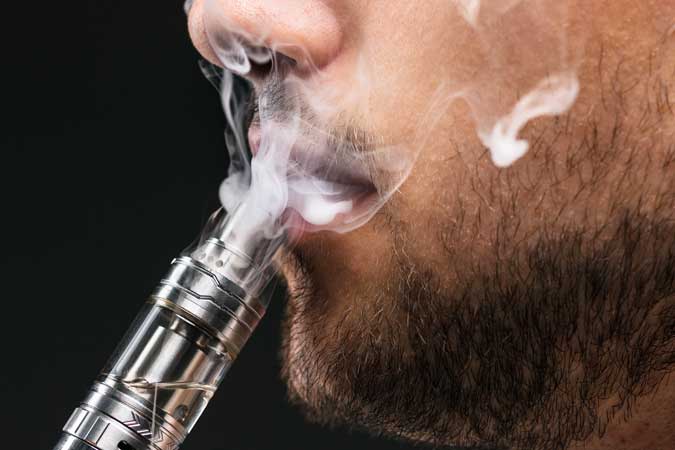
Static
By Marvin Tort

The House of Representatives was reported to have approved on final reading recently House Bill 9007 or the proposed Non-Combustible Nicotine Delivery Systems Regulation Act. The bill covers the manufacture, use, sale, packaging, distribution, advertisement, and promotion of electronic nicotine and non-nicotine delivery systems (ENDS/ENNDS) and heated tobacco products (HTPs).
I note four interesting points in the bill that I believe require further scrutiny:
• The Department of Trade and Industry, in consultation with the Food and Drug Administration (FDA) and/or the Inter-Agency Committee on Tobacco, to set product standards for ENDS/ENNDS and HTPs. But DTI, and not FDA, will regulate the sale and use of ENDS/ENNDS and HTPs
• The minimum age for persons allowed to purchase ENDS/ENNDS and HTPs was lowered to 18 years from 21 years
• Online sale and advertisement of ENDS/ENNDS and HTPs is allowed, as long as the website or e-commerce platform restricts sales to those under 18
• Sale packs will not require graphic warnings on the possible hazards of ENDS/ENDDS and HTP use
House health committee chairman Quezon Rep. Angelina DL Tan reportedly opposed HB 9007 for being too lax in terms of health safeguards. She was quoted as saying, “I cannot in any manner support House Bill No. 9007… as it pretends to be a health measure… it gives primordial consideration to trade and commercial interests of the few.”
Even Muntinlupa Rep. Rozzano Rufino B. Biazon noted that the “bill has turned into a trade and industry measure rather than a health measure as we started out. This bill does not protect the youth from the harm of END/ENNDS abuse addiction and as well as the vapes and HTPs because of the permissiveness of the online trading and advertising rules, which IT experts said cannot guarantee the protection of the youth from access.”
Personally, I prefer that government completely ban all forms or manner of smoking, which I believe does not have any redeeming value. Smoking has no known public benefits other than being a source of government revenue. However, a complete ban is wishful thinking. So, I support the tobacco and e-cigarette industry only in terms of the jobs and taxes it generates.
But Congress should at least limit smoking and electronic cigarette use to those 21 years and above. All sales packs, like cigarettes, should carry graphic warnings on the ills of smoking, and all forms of sponsorship and advertising should be banned, just like with regular tobacco products. And, the FDA — and not the DTI — should regulate the sale and use of ENDS/ENDDS and HTPs. The same goes for regular cigarettes and tobacco products. They should be under FDA as well.
The ultimate objective of smoking regulation is the protection of public health, and that regulation plus taxation aims to bring down smoking prevalence and promote public health. Reducing smoking prevalence aims to cut down smoking-related illnesses and smoking-related deaths. By doing so, we bring down health insurance costs and public healthcare costs. In the meantime, tobacco and e-cigarette industries generate jobs and taxes.
In this line, I believe that regular and electronic cigarettes should both be regulated and taxed the same way, or at least subjected to the similar regulations and parameters for sale and use, and marketing. They should both be regulated similarly, for their “negative externalities.” Their high tax revenue potential is incidental.
With HB 9007, public health is secondary, it seems. Why else lower the sale age to 18 from 21? Why allow online advertising and sale for ENDS/ENNDS and HTPs? Why do away with graphic warnings on the ills and hazards of smoking for ENDS/ENNDS and HTPs? And why not let the FDA, instead of the DTI, regulate the sale and use of e-cigarettes?
In July 2019, the Department of Health (DoH) issued Administrative Order 2019-0007 to complement President Duterte’s Executive Order No. 26 that imposed a nationwide ban on cigarette and tobacco smoking in public places starting 2017. The AO expanded the coverage of EO 26 to include “vaping,” or the use of electronic nicotine and non-nicotine delivery systems.
At that point, e-cigarettes — whether or not they use nicotine — were put at par with regular cigarettes and were banned in all places where smoking was likewise prohibited: public areas like schools, workplaces, government offices and facilities, churches, hospitals, transport terminals, markets, and parks and resorts, among others. Containers of vaping products must also have graphic health warnings.
But unlike regular cigarettes, DoH also ordered businesses or entities that manufacture, distribute, import and export, as well as sell or trade online all types of vaping products to first secure permits from the FDA. Also, unlike regular cigarettes, a nicotine ban was practically imposed by prohibiting the sale of nicotine “shots” and nicotine “concentrates” used in vaping devices.
By October 2019, Health Undersecretary Eric Domingo was also quoted in a news report as saying that vaping or using e-cigarettes was not a proven nicotine replacement therapy and that it could cause lung illness as well. He also noted that vaping was unsafe and bad for one’s health, and that vaping “products [were] not good alternatives to normal or regular cigarettes.” In short, to the DoH, there is no difference between cigarettes and e-cigarettes.
But with HB 9007, lawmakers seem to believe that there is a distinction and difference between the two, and chooses to “legislate” that distinction by “unlevelling” the playing field, so to speak. HB 9007 seems to give unwarranted or undue advantage to the ENDS/ENNDS and HTPs by allowing online sale and by not requiring graphic warnings.
I used to believe that a distinction must be made as well, thinking that ENDS/ENNDS and HTPs were “better” alternatives to tobacco. The lesser of two evils. At this point, however, given more recent scientific studies indicating also the ills of ENDS/ENNDS and HTPs, I consider both regular cigarettes and e-cigarettes as similar public health hazards.
Tax revenue potential should be secondary to public health. Regulations should not “un-level” the playing field, and thus compromise public health, by giving advantage to the marketing of ENDS/ENNDS and HTPs over regular cigarettes. After all, the tobacco industry is not in direct competition with tobacco alternatives. E-cigarettes and regular cigarettes are just the two hands of the same body. Why treat them differently?
Marvin Tort is a former managing editor of BusinessWorld, and a former chairman of the Philippine Press Council